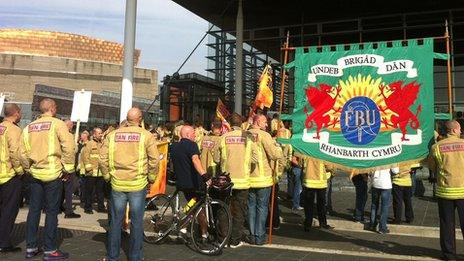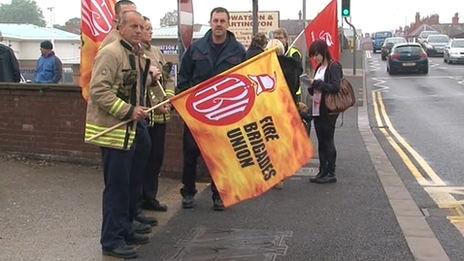Firefighters in Wales strike over pensions row
- Published
Unions oppose plans to make members work until 60 but ministers say public sector pensions must be "sustainable"
Firefighters in Wales have returned to work after a four-hour strike in a row over pensions.
Fire chiefs said crews had been in place to tackle 999 calls during the walk-out from noon to 16:00 BST on Wednesday.
Military personnel were on standby in south Wales with calls elsewhere being prioritised on "protection of life".
Unions oppose plans to make members work until 60 but ministers say public sector pensions must be "sustainable".
Around 300 Fire Brigades Union (FBU) members staged a rally in Cardiff Bay while picket lines were in place around Wales.
In south Wales the fire service's contingency included six fire engines staffed by military firefighters placed at bases at Abergavenny, Bridgend, Newport, Pontypridd and two within the Cardiff area, as well as a further support crew.
Mid and West Wales Fire and Rescue Service advised people to take extra care but said it was "fortunate" to have a staff who were not FBU. It sent a crew to a minor flood at a house in Skewen, near Neath.
Chief fire officer Richard Smith said: "All emergency calls were dealt with professionally, swiftly and satisfactorily throughout the entire period of strike action."
North Wales Fire and Rescue Service had been expecting a large number of its personnel to take part in the strike and had urged local residents to take extra care. It deployed one crew to a house fire in Bryn-y-Maen in Colwyn Bay. No one was hurt.
The Ministry of Defence (MoD) confirmed it had provided support to the Welsh government during the strike.
Councils had issued advice to staff at schools, care homes and sports centres, and held contingency talks with businesses and other agencies in advance of the action.
Refinery and energy companies in Pembrokeshire were asked to ensure they had additional plans in place, while Neath Port Talbot council was reported to have asked businesses not to use angle-grinders during the strike to minimise fire risk from sparks.
Speaking at the strikers' rally in Cardiff Bay, Mark Watt of the FBU admitted firefighters did have a good pension but claimed they "pay heavily" for it.
"It's a decision to go on strike that no firefighter will take lightly and we've taken this decision because we cannot get any constructive negotiations with the ministers," he added.

Around 300 firefighters held a rally at the Senedd in Cardiff Bay
In Wales, the Welsh government holds responsibility for the fire service and has been negotiating on the pension issue but Treasury rules limit its ability to diverge from UK-wide arrangements.
The FBU is opposing plans put forward by UK ministers not to allow firefighters to take their full pension until the age of 60.
The union said many firefighters would not be able to maintain fitness standards into their late 50s and this would endanger the public.
'Extremely physical'
Under the plans in England, those retiring early would lose thousands of pounds a year, the FBU argues.
Roger Curran, secretary for the FBU in Mid and West Wales, told BBC Radio Wales it was unrealistic to expect firefighters to still be working flat out at 60.
"It's an extremely physical job. How many front-line military personnel do you see running around in Afghanistan? How many police officers between the ages of 50 and 60 do you see running around the streets chasing criminals?" he said.
"You don't - and there is a reason for that. It is not just the physicality of the job, it is also the psychology of the job.
"It's about the portfolio of distressing events that you build up over years and years, and I think that is an important part that people are missing."

Firefighters at a picket line in Wrexham
The Welsh government said public sector pensions had to be "sustainable" but discussions with the FBU continued to be positive and constructive.
A spokesperson said: "Welsh ministers have regularly met the FBU regarding pension issues and have sent a clear message to the FBU of our commitment to public service pension schemes which are affordable, sustainable and fair to all public service workers."
- Published3 October 2013
- Published29 August 2013